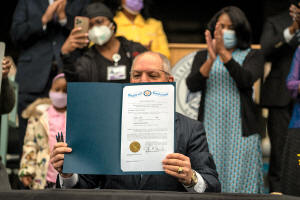Louisiana governor pardons plaintiff in landmark Supreme Court racial
segregation case
 Send a link to a friend
Send a link to a friend
 [January 06, 2022]
By Kathleen Flynn [January 06, 2022]
By Kathleen Flynn
NEW ORLEANS (Reuters -Louisiana's governor
on Wednesday posthumously pardoned Homer Plessy, the plaintiff in the
landmark 1896 U.S. Supreme Court case that upheld the "separate but
equal" doctrine and laid the legal foundation for decades of racial
segregation.
Governor John Bel Edwards, who signed the pardon at a ceremony in New
Orleans near the spot where Plessy was arrested in 1892 for riding a
whites-only train car, traced a line from the historic case to racial
inequities in U.S. society today.
"The stroke of my pen on this pardon, while momentous, it doesn't erase
generations of pain and discrimination," Bel Edwards said. "We can all
acknowledge we have a long ways to go, but this pardon is a step in the
right direction."
The official act follows a state board's unanimous decision in November
to recommend a pardon of Plessy, who deliberately sat in a whites-only
rail car to test a Jim Crow-era law aimed at marginalizing him and other
Black citizens after the Civil War.

Plessy, a shoemaker who was active in a civil rights group, was
immediately arrested. His case was heard in Louisiana by Judge John
Howard Ferguson, who ruled against Plessy, setting off a chain of events
that led to the 1896 Supreme Court case.
Descendants of the Plessy and Ferguson families were at the event.
Plessy, who was 30 years old at the time of his arrest, pleaded guilty
in 1897 following the Supreme Court ruling and paid a $25 fine. He died
in 1925.
[to top of second column]
|

Louisiana Governor John Bel Edwards holds a signed pardon for Homer
Plessy, the plaintiff in the 1896 U.S. Supreme Court case which
upheld the "separate but equal" doctrine that allowed for decades of
segregationist laws against Black people, in New Orleans, Louisiana,
U.S., January 5, 2022. REUTERS/Kathleen Flynn
 "I feel like my feet are not
touching the ground today because the ancestors are carrying me,"
said Keith Plessy, a first cousin three times removed from Plessy.
"Homer Plessy will have his way today."
In the Plessy vs. Ferguson case, the Supreme Court judges ruled that
separate public facilities could be provided to different racial
groups as long as they were of equal quality.
The ruling provided the legal basis for segregating schools and
other public facilities and held until the Supreme Court's decision
in a 1954 case known as Brown v. Board of Education, which started
the process of ending racial segregation.
Governor Bel Edwards and other speakers at the event said the pardon
highlighted the importance of acknowledging and educating the public
about past injustices rather than promoting a sanitized version of
history.
In some U.S. school districts, conservatives have sought to ban
teaching of concepts from critical race theory, an academic
framework that examines how racism has shaped American society.
"We cannot undo the wrongs of the past but we can and should
acknowledge them and learn from them," said Phoebe Ferguson, a
descendant of Judge Ferguson.
(reporting by Nathan Layne in Wilton, Connecticut; Editing by Tomasz
Janowski and Cynthia Osterman)
[© 2022 Thomson Reuters. All rights
reserved.] This material may not be published,
broadcast, rewritten or redistributed.
Thompson Reuters is solely responsible for this content. |